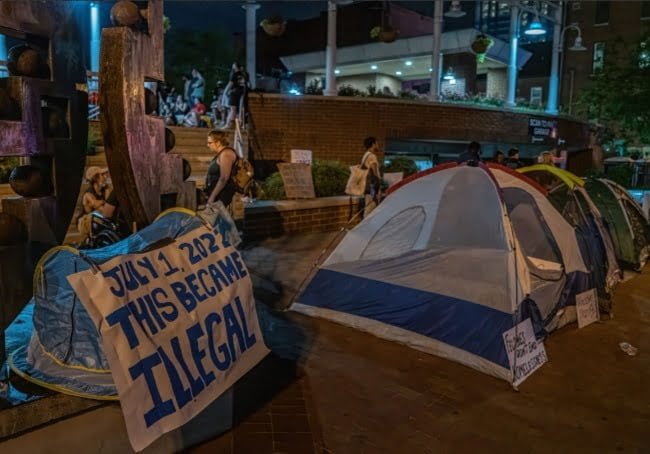
By Camm Ashford
Dozens of new laws passed in the last session of the Tennessee General Assembly took effect on July 1.
One such law, the “CROWN” Act, or HB 204, bans employers from discriminating against natural hair or protective hairstyles like braids, locs, twist or bantu knots–especially those which express “characteristics associated with a certain race.” State Rep. Karen Camper and state Sen. Raumesh Akbari, both Democrats from Memphis, sponsored the bill.
CROWN is an acronym for Creating a Respectful and Open World for Natural Hair. The CROWN Act is now law in 17 states. California was the first state to pass legislation outlawing racial discrimination against people based on their natural hairstyles. As of July 1, Tennessee is the first state in the Mid-South to make the CROWN Act law.
“I think people have a right to be proud of their hair and who they are, and now this bill is going to protect them so that they can’t be fired because of it,” Sen. Akbari said.

The CROWN Act does not apply to public safety employees if a protective style would prevent them from performing essential parts of their job.
The act will allow employees who face discrimination to file a complaint to the federal government.
Under HB 1459, those arrested on accusations of domestic abuse must stay away from the victim’s residence for at least 24 hours. State Rep. Yusuf Hakeem, D-Chattanooga, and state Sen. Jeff Yarbro, D-Nashville, sponsored this law.
To impose stricter penalties on criminals who engage in drive-by shootings, another law requires that a person convicted of aggravated assault that involved the use or display of a deadly weapon be punished one classification higher than otherwise provided by law if the violation was committed by discharging a firearm from within a motor vehicle. Rep. John Gillespie, R-Memphis, and Sen. Paul Rose, R-Tipton, sponsored HB 2009 to “crack down on drive-by shootings.”
Truth in Sentencing, or HB 2656, will require those convicted of violent crimes, including aggravated assault, murder, carjacking, aggravated burglary and kidnapping, to serve their entire sentence without a chance of reduced time. State House Speaker Cameron Sexton, R-Crossville, and Lt. Gov. Randy McNally, R-Oak Ridge, sponsored the bill.
“Joker’s Law,” or HB 1646, will impose felony punishment for killing or harming a service animal without the owner’s consent. The bill’s namesake is K-9 Joker, who was shot in 2021 while pursuing burglary suspects in Cleveland. Rep. Mark Hall, R-Cleveland, and Sen. Mike Bell, R-Riceville, sponsored the law.
Homemade food will be exempt from regulation under the “Tennessee Food Freedom Act,” or HB 813. Producing or selling homemade food will be free of state regulations, unless officials are investigating food-borne sickness. State Rep. Justin Lafferty, R-Knoxville, and state Sen. Frank Niceley, R-Strawberry Plains, sponsored the measure.
Overall, there’s little controversy about the CROWN Act, or lesser known new laws such as the one that requires utility companies to provide the estimates of connection fees to potential customers, or one that allows defendants for whom bail has been set to pay with a debit card instead of cash.




Other laws–like the one that requires school librarians to classify material as obscene even if it has educational value; the one banning transgender athletes from competing in women’s sports at public colleges and universities, as well as private institutions that compete against them; and the law that criminalizes camping on public property–have made headlines and stirred outcry as they progressed through legislatures this year.
Officials will consider camping on public property a felony, and camping along a highway, on-ramp or off-ramp a misdemeanor under HB 0978. Sponsors Sen. Paul Bailey, R-Sparta, and Rep. Ryan Williams, R-Cookeville, defended the bill as a tool local law enforcement could use to address homelessness.
Advocates for Tennessee’s homeless population contend the law which defines camping as erecting tents or tarps under bridges or overpasses and alongside state highways, as targeting houseless Tennesseans.
“Tennessee is poised to double down on using the criminal legal system to punish the poor,” the Vera Institute of Justice said in a statement. “The additional threat of a felony charge for public camping is likely to push unhoused Tennesseans into deeper desperation.”
Gov. Bill Lee said he didn’t approve of the new law and didn’t sign it, saying he wants to look for alternatives to it, but let it become law without his signature.
To protest the new law, last week several hundred people in Nashville marched through the streets of downtown before setting up tents and sleeping on benches overnight to test it.
Metro Nashville Police declined to make arrests.
